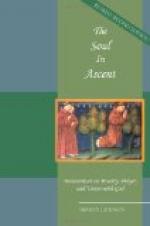The soul awakens because it grows, and its growth is sure. Everything that is alive must grow; only death is stationary. It is as natural for us sometime to know ourselves as having relations both to the seen and the unseen as for our bodies to increase in stature. The Confession of Augustine[3] is true of all, “Thou madest us for Thyself, and our heart is restless until it repose in Thee.”
[Footnote 3: Confessions. Book I, 1.]
The soul turns toward God as naturally as children turn toward their parents. I know no other way of explaining the fact that in all ages the majority of the people have had faith in some kind of a deity; and that, widely as they differ as to what is right, all feel that they should follow their convictions of duty. The various ethnic religions, however repulsive, cruel, and vile some of their teachings may be, all indicate a realization of dependence, and all, in some way, bear witness to man’s longing for God. Augustine was right—“The heart is restless until it repose in Thee.”
The healthful soul will always move along the pathway of growth. The next stage in its evolution after its birth is its awakening. Its progress may be hindered, but it cannot be prevented, and it may be hastened.
The means by which a soul comes to its self-realization has been a favorite study with poets, dramatists, and novelists. Marguerite, in “Faust,” was a simple, sweet, sensuous, traditionally religious girl until she was rudely startled by the knowledge that she was a great sinner; that moment the scales began to fall from her eyes. In her, Goethe has shown how one class of persons, and that a large class, come to self-realization.
Victor Hugo, in a passage of almost unparalleled pathos, has pictured in Jean Valjean a kind of big human beast who, when half awake, steals a loaf of bread to save others from starving, but who is startled into fullness of manhood by the sympathy and consideration of the good Bishop whose silver he had also stolen.
Hawthorne, in Donatello, has pictured a beautiful creature fully equipped with affections, emotions, passions, but with little consciousness of responsibility, until the fatal moment in which a crime illuminates his soul like a flash of lightning.
Such experiences are not to be compared with those of the prodigal son or of Saul. Before the one was reduced to husks, or the light blazed upon the other, they felt the obligation to do right. The prodigal chose pleasure with his eyes wide open and Saul was, mistakenly but truly, trying to do God’s will even when he assisted in the stoning of Stephen.
Hugo, Goethe, and Hawthorne have accurately delineated single steps in the growth of the soul. They have shown how the process of the soul’s awakening may be, and often has been, hastened. It may be hindered by false ideals and a vicious environment, and it may be hastened by lofty ideals and a holy environment.




